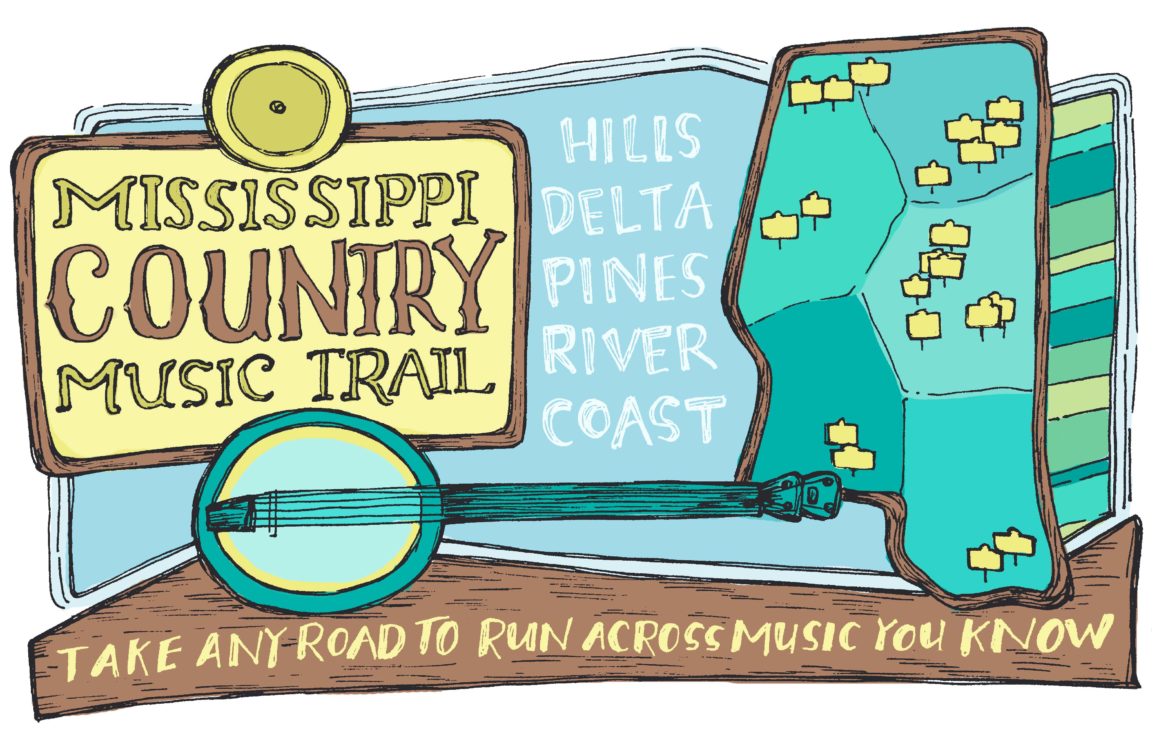Nashville might get credit for being the hub of the country music industry, where the producer contracts are made and records are cut, but the music itself doesn’t always come from Music City. A lot of times, the music comes to it.
Country music’s roots begin farther south along the Natchez Trace Parkway, across two state lines and deep into Mississippi, where the organic, traditional music of Appalachia intersected the rural blues music of the Delta.
Tourists and residents can discover the origins of this enduring American music on the Mississippi Country Music Trail, a series of 30 marked sites that celebrate the art form’s genesis with Jimmie Rodgers in Meridian and continue through its evolution and commercial peaks. The trail started June 1, 2010, with a marker celebrating Rodgers’ contributions. Each marker has a short biography of the performer being honored or a description of the significance of a particular place, as well as photographs of people, places and memorabilia.
“It’s our cultural story that sets us apart,” says Malcolm White, executive director of the Mississippi Arts Commission. “(It’s important to) tell our cultural story through music, literature, the arts, culinary, civil war, civil rights — all these huge components that we lay claim to.”
White has worked on the historic trails initiative as a member of the Mississippi Blues Commission and as former director of Visit Mississippi, the tourism division of the Mississippi Development Authority. He also was part of the first group to attempt the blues trail project in the 1980s under Gov. Ray Mabus, although it never was funded and eventually dissolved. Gov. Haley Barbour established a new effort in the 2000s that led to the current blues, country music and freedom trails.
“In the beginning it was just about marking things,” said White. “Then it began to be about making creative corridors and communities where people would show up to do one thing and end up doing 10 things.”
The Mississippi Blues Trail brought together more than 200 historic sites across the state under one constellation, putting a narrative to Mississippi’s legacy in blues music and its cultural impact. Attractions such as the B.B. King Museum in Indianola and the Grammy Museum Mississippi in Cleveland, as well as Ground Zero Blues Club in Clarksdale, expand upon the narrative that Mississippi is the birthplace of American music.
On the heels of the success of the blues trail, an advisory board put together a commission of scholars including Barry Mazor, author of the biography Meeting Jimmie Rodgers, to draft a list of names and events for the Country Music Trail’s initial 30 sites, which included famous performers Faith Hill, Tammy Wynette, Charley Pride, Conway Twitty and more from every corner of the state.
The trail aims to trigger more music tourism and invigorate the state’s creative economy, and that idea appears to have legs. Site preparation and construction of the Mississippi Arts & Entertainment Experience are underway in Meridian. The 58,000-square-foot facility, located two blocks from “father of country music” Jimmie Rodgers’s Country Music Trail marker, will tell the state’s artistic history through immersive, media-driven, interactive exhibits and events.
White gives much of the credit for getting the Country Music Trail project done quickly to Philadelphia, Miss., native and performer Marty Stuart, whose personal collection of 20,000 country-music memorabilia pieces makes up a large portion of the displays at the Country Music Hall of Fame in Nashville.
“He took it on as a personal project,” says White. “He’s such a historian of country music that he went before the Legislature and really pushed hard to build the Country Music Trail.”
Stuart, a country music historian and archivist since his days in Johnny Cash’s backing band, also helped bridge the span between his home state, where many of the genre’s pivotal performers and songwriters grew up, to Nashville, where Mississippi-raised songwriters such as Paul Overstreet and Craig Wiseman moved to make their mark on the industry.
When Stuart, White and Mac McAnally, a Nashville songwriter and director of Jimmy Buffett’s Coral Reefer Band, set out to commemorate the contributions Mississippians have made to country music with a trail marker in Nashville, they ran into roadblocks everywhere they went. They were told that it would never happen. But they had a plan and a crucial ally.
The trio recruited Craig Wiseman, another singer-songwriter with deep roots in Mississippi but wide branches in Music City, who happened to own a building on Music Row, the heart of the city’s music business.
“When I went to talk to Craig about putting a marker on his property, he was all for it,” says White. “He allowed us to place a marker on Music Row that talks about everything from Elvis Presley to Jimmie Rodgers, Tammy Wynette and all the great Mississippians who came to Nashville to make their mark.”
White noted that the goal wasn’t to get anyone to move from Nashville, but to tell a fuller version of Mississippi’s story.
“We’ve always seen this trail as a way to honor Mississippians and tell our story,” said White. “We have blues markers in Los Angeles, Chicago, France and all over the world, because the blues is a global phenomenon, and so is country music.”
For information on the Mississippi Country Music Trail, including views of the trail markers and maps, visit mscountrymusictrail.org.
Historic trail celebrates success of country music in Mississippi

